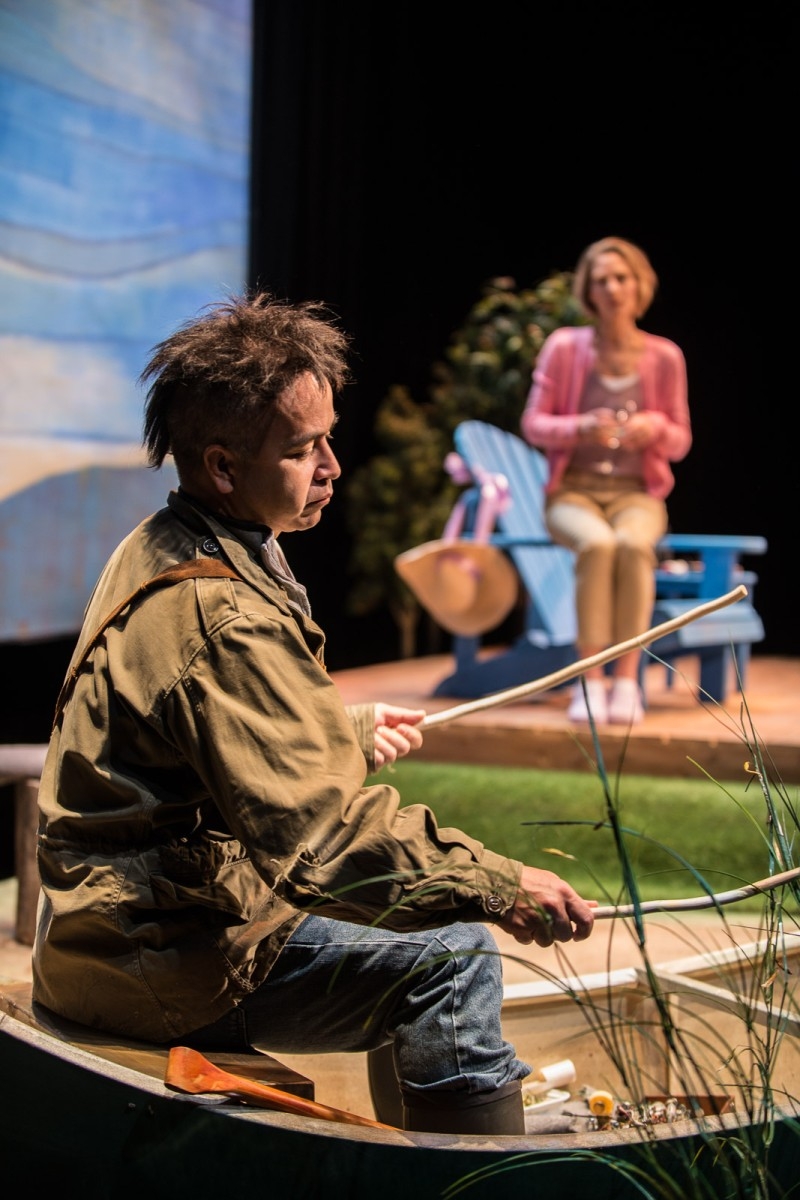A Space Divided: GCTC’s Cottagers and Indians, an evocative disavowal of white privilege

Photo Andrew Alexander, Herbie Barnes and Phillippa Domville,
The split is clear upon first glance.
He wears muddy jeans and rain boots, while she dons pristine khakis and purple Crocs. His space boasts shoots of wild rice, while hers stands testament to an outdoor grill. Between our two figures lies a shoreline, a dock, and a bright green Astroturf divide.
Drew Hayden Taylor’s Cottagers and Indians, directed by Richard Rose (Artistic Director of Tarragon Theatre), is an empathetically-sharp look into the strident echoes of Canadian colonisation. Over the course of eighty minutes, we as an audience become acquainted with the Indigenous communities fighting to take up space in the ways they deem urgent, while also listening to those whose purchased, lakefront property has become implicated in this attempt at cultural reclaim. Taylor’s artistic voice is refreshing in its generosity to its audience; it does not take sides, and does not favour one character over the other in its navigation of difficult social issues. Taylor guides his listeners without preaching to them; as such, his points speak for themselves in a way that is oh-so-powerful.
Cottagers and Indians features a cast of two: Herbie Barnes as Arthur and Philippa Domville as Maureen. Despite never being allowed to physically populate the same playing spaces, Barnes and Domville have a lovely chemistry, one that subtly shifts from antagonistic to playful to sympathetic. Individually, Barnes and Domville each bring a nuanced depth to their characters that excuses the perhaps-overexecution of a script that might lend itself better to a smaller, more intimate staging. Barnes’ blend of comic timing and capacity for internal reflection is spot-on, and Domville (who faces the more difficult task of navigating Maureen’s privilege in a way that doesn’t sound clichéd or laugh-out-loud tone-deaf) successfully balances her storytelling with the more active desire to rally for her home.
Cottagers and Indians fits neatly within the GCTC tradition of high production values, but this piece, unfortunately, doesn’t quite benefit from the subsequent, fully-imagined set design. Maureen’s space holds an infinity of potential tasks for her (from grilling her chicken to reading her book to exploring the space around her dock), while Arthur’s feels overburdened by the presence of the canoe onstage. The canoe is an excellent visual device, to be sure, but begs the question as to why there is such spatial imbalance between Arthur and Maureen; it seems Arthur could be given more room (in what is supposedly the entirety of the lake, as opposed to what is only her shorefront) to explore and to demonstrate his daily harvest. This minor issue aside, the fact that Cottagers and Indians feels more like an (excellent) Fringe script speaks not to a misstep in direction, but more as testament to the fact that this production still manages to overwhelmingly succeed despite taking place in a space that doesn’t quite fit its needs.
Richard Rose achieves the commendable in his shaping of the Arthur/Maureen dynamic through what is largely an expository script; Drew Hayden Taylor’s authorial voice is wonderful, but relies largely upon storytelling, rather than more typical, Western-style dramatic devices. Cottagers and Indians is a fascinating mediation between two modes of expression, and Richard Rose’s direction allows the figures onstage to navigate their successes and their tragedies with grace and with subtlety.
GCTC’s commitment to discourse and to educated, well-prepared audiences must be pointed out, as well. The Cottagers and Indians program provides several options for further reading, and makes clear that GCTC’s core staff have committed themselves to being the most-prepared for analysis and discussion that they can possibly be; this is symptomatic of a strong, dramaturgically-growing company, one with a public desire to keep improving and cultivating the best in Ottawa theatre. Cottagers and Indians is, on the whole, successful, and offers an urgent message within its comedic outer shell.
Cottagers and Indians runs at GCTC until December 15. Tickets can be purchased at www.gctc.ca.